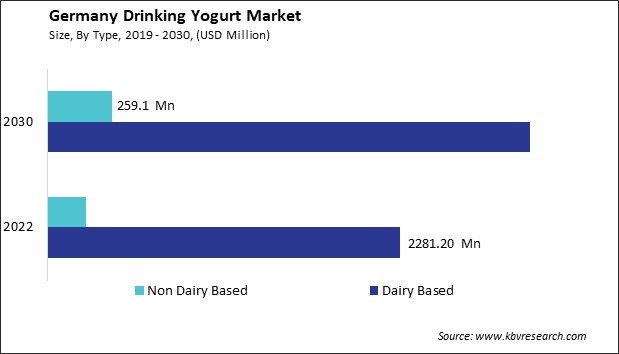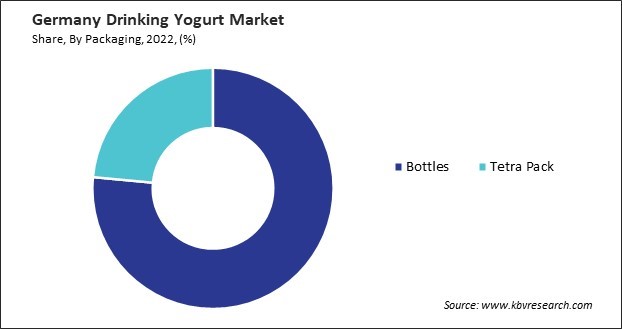The Germany Drinking Yogurt Market size is expected to reach $3.5 Billion by 2030, rising at a market growth of 4.4% CAGR during the forecast period. In the year 2022, the market attained a volume of 309.0 million litres, experiencing a growth of 4.6% (2019-2022).
The drinking yogurt market in Germany has witnessed a significant surge in popularity and consumer demand in recent years, reflecting a growing trend toward healthier and more convenient food choices. This burgeoning industry is characterized by diverse products catering to various consumer preferences and dietary requirements.

One of the key drivers behind the success of the drinking yogurt market in Germany is the country's strong focus on health and wellness. German consumers are increasingly seeking products that not only offer taste but also provide nutritional benefits. With its combination of probiotics, vitamins, and minerals, drinking yogurt has positioned itself as a preferred option among health-conscious individuals. Furthermore, convenience plays a pivotal role in the popularity of drinking yogurt in Germany. With an on-the-go lifestyle becoming increasingly common, consumers appreciate the portability and ease of consumption that drinking yogurt provides.
E-commerce has become a significant driving force in the drinking yogurt market in Germany, transforming the way consumers access and purchase these products. The online platform has proven to be a convenient and efficient channel for established brands and new entrants to reach a wider audience and meet the evolving preferences of German consumers.
According to the International Trade Administration, 2022 total sales were estimated at USD 141.2 billion, reflecting an impressive 11 % growth compared to the previous year. The online population in Germany is anticipated to increase from 62.4 million in 2020 to 68.4 million in 2025. Remarkably, the e-commerce penetration in Germany reached a significant 80 % in 2022, ranking as the third highest globally. The substantial growth of e-commerce in Germany indicates a thriving industry, contributing to the nationwide notable expansion of the drinking yogurt industry.
In Germany, the drinking yogurt market has witnessed consumers' significant preference for berry-flavored variants. The popularity of berries, such as strawberries, blueberries, and raspberries, has contributed to this segment's dominance of berry-flavored options. This trend is deeply rooted in the German consumer's appreciation for natural and fruity tastes, aligning with their inclination towards healthy and refreshing beverage choices.
The German drinking yogurt market's penchant for berries in drinking yogurt is attributed to several factors. Firstly, berries are perceived as rich in vitamins, antioxidants, and other health-promoting compounds. This aligns with the health-conscious mindset prevalent among German consumers who seek flavorful and nutritious options. As a result, manufacturers have capitalized on this demand by incorporating berry flavors into their drinking yogurt products.
Furthermore, berries' versatile and adaptable nature allows for diverse formulations, enabling a wide range of berry-infused drinking yogurts to cater to different consumer preferences. Whether blended into smoothies, paired with creamy textures, or combined with other complementary flavors, berry-infused drinking yogurts offer a sensory experience that resonates with the German palate. The demand for berry-flavored drinking yogurts is also influenced by changing consumption patterns and the growing popularity of on-the-go snacking.
Manufacturers in Germany continue to innovate by introducing new berry variants, experimenting with unique combinations, and emphasizing using high-quality, locally sourced ingredients. Marketing strategies often highlight these berry-infused products' natural and wholesome aspects, aligning with the broader trend of clean and transparent food and beverage choices in the German industry. Thus, Germany's thriving preference for berry-flavored drinking yogurts stems from a cultural appreciation for natural, health-conscious choices.
The demand for non-dairy alternatives has witnessed a significant surge in the dynamic landscape of the German drinking yogurt market, reflecting the evolving consumer preferences towards healthier and plant-based options. The emergence of non-dairy raw materials has become a pivotal force, reshaping the traditional dairy-dominated sector.
Almond milk has emerged as a prominent non-dairy raw material in the German drinking yogurt sector. Its creamy texture and nutty flavor resonate with consumers seeking an alternative to conventional dairy. Oat milk is another rising star in this industry, gaining popularity for its environmental sustainability and nutritional profile. The gluten-free nature of oats appeals to health-conscious consumers, contributing to the expanding industry share of oat-based drinking yogurts.
Soy, a long-established player in the non-dairy sector, continues to maintain a solid presence in the German industry. Rich in protein and with a neutral taste, soy-based drinking yogurts cater to a wide audience. Coconut milk, known for its tropical essence, has also carved a niche, appealing to those looking for a refreshing and exotic twist in their yogurt consumption.
The German consumer's increasing emphasis on holistic well-being and eco-friendly choices drives manufacturers to innovate and diversify their offerings. Therefore, the German drinking yogurt market is transforming as consumers increasingly opt for non-dairy alternatives fueled by health consciousness and sustainability concerns.

Germany boasts a robust industry for drinking yogurt, with several key companies contributing to its growth and diversity. The country's affinity for dairy products, coupled with a focus on health and wellness, has fueled the popularity of drinking yogurt among consumers. One notable contender in the German drinking yogurt market is Müller. Established in 1896, Müller has evolved into a household name, synonymous with high-quality dairy products. The company's foray into the drinking yogurt sector aligns with its commitment to providing consumers with nutritious and delicious options. Müller's range of drinking yogurts caters to diverse tastes, incorporating innovative flavors and formulations that resonate with German preferences.
Arla Foods, a cooperative with a strong presence in Germany, has also made significant inroads into the drinking yogurt market. The brand has garnered consumer trust because it emphasizes sustainability and farmer-friendly practices. The company's drinking yogurt offerings often highlight natural ingredients and are considered wholesome choices for health-conscious individuals. Arla's commitment to transparency in its sourcing and production processes further resonates with German consumers who prioritize ethical considerations.
Privately-owned company Ehrmann is another key player in the German drinking yogurt sector. Founded in 1920, Ehrmann has a rich history of dairy expertise. The company's innovative approach to product development has led to the introduction of novel flavors and functional formulations in the drinking yogurt category. Ehrmann's agility in changing consumer preferences has contributed to its sustained success in the dynamic German industry.
In recent years, the German drinking yogurt market has witnessed the entry of international players such as Danone. The global giant has adapted its offerings to suit local preferences, introducing a range of drinking yogurts tailored specifically for the German industry. Danone's commitment to promoting health through its products aligns with German consumers' growing emphasis on wellness.
The competitive landscape also features regional players like Andechser Molkerei Scheitz, known for its organic dairy products. This company has capitalized on the increasing demand for organic and sustainably produced goods in Germany, carving a niche in the drinking yogurt market. Therefore, Germany's drinking yogurt market is characterized by diverse companies catering to consumers' multifaceted preferences. Whether through a focus on tradition, innovation, sustainability, or international expertise, these companies collectively contribute to the rich tapestry of choices available to German consumers in the thriving drinking yogurt market.
By Type
By Packaging
By Flavor
By Distribution Channel
Our team of dedicated experts can provide you with attractive expansion opportunities for your business.

